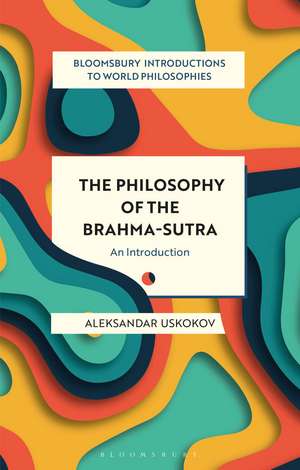The Philosophy of the Brahma-sutra: An Introduction: Bloomsbury Introductions to World Philosophies
Autor Aleksandar Uskokoven Limba Engleză Paperback – 19 oct 2022
| Toate formatele și edițiile | Preț | Express |
|---|---|---|
| Paperback (1) | 114.50 lei 22-36 zile | +37.14 lei 5-11 zile |
| Bloomsbury Publishing – 19 oct 2022 | 114.50 lei 22-36 zile | +37.14 lei 5-11 zile |
| Hardback (1) | 345.23 lei 43-57 zile | |
| Bloomsbury Publishing – 19 oct 2022 | 345.23 lei 43-57 zile |
Din seria Bloomsbury Introductions to World Philosophies
- 8%
 Preț: 119.09 lei
Preț: 119.09 lei - 15%
 Preț: 136.56 lei
Preț: 136.56 lei - 19%
 Preț: 131.83 lei
Preț: 131.83 lei - 19%
 Preț: 145.90 lei
Preț: 145.90 lei - 19%
 Preț: 119.26 lei
Preț: 119.26 lei -
 Preț: 138.93 lei
Preț: 138.93 lei - 19%
 Preț: 119.09 lei
Preț: 119.09 lei - 8%
 Preț: 147.69 lei
Preț: 147.69 lei - 13%
 Preț: 113.40 lei
Preț: 113.40 lei - 6%
 Preț: 117.16 lei
Preț: 117.16 lei - 6%
 Preț: 117.16 lei
Preț: 117.16 lei -
 Preț: 122.63 lei
Preț: 122.63 lei - 18%
 Preț: 114.04 lei
Preț: 114.04 lei - 8%
 Preț: 133.61 lei
Preț: 133.61 lei - 21%
 Preț: 117.16 lei
Preț: 117.16 lei - 8%
 Preț: 133.15 lei
Preț: 133.15 lei -
 Preț: 148.45 lei
Preț: 148.45 lei - 7%
 Preț: 123.53 lei
Preț: 123.53 lei - 19%
 Preț: 130.49 lei
Preț: 130.49 lei
Preț: 114.50 lei
Preț vechi: 139.41 lei
-18% Nou
Puncte Express: 172
Preț estimativ în valută:
21.91€ • 22.94$ • 18.13£
21.91€ • 22.94$ • 18.13£
Carte disponibilă
Livrare economică 17-31 martie
Livrare express 28 februarie-06 martie pentru 47.13 lei
Preluare comenzi: 021 569.72.76
Specificații
ISBN-13: 9781350150003
ISBN-10: 1350150002
Pagini: 240
Dimensiuni: 138 x 216 x 20 mm
Greutate: 0.32 kg
Editura: Bloomsbury Publishing
Colecția Bloomsbury Academic
Seria Bloomsbury Introductions to World Philosophies
Locul publicării:London, United Kingdom
ISBN-10: 1350150002
Pagini: 240
Dimensiuni: 138 x 216 x 20 mm
Greutate: 0.32 kg
Editura: Bloomsbury Publishing
Colecția Bloomsbury Academic
Seria Bloomsbury Introductions to World Philosophies
Locul publicării:London, United Kingdom
Caracteristici
Elucidates the character and nature of early Vedanta, making it possible to understand this influential tradition of Indian philosophy on its own terms and in its own context
Notă biografică
Aleksandar Uskokov is Sanskrit Lector in the South Asian Studies Council at Yale University, USA.
Cuprins
AcknowledgementsNote on Sanskrit Transliteration and TranslationAbbreviations Chronological Table of Commentaries Introduction: Situating the Brahma-sutra1. Reception History2. Philosophy, Theology, and the Idea of Scripture3. Ontology and the Problem of Causality 4. The Purpose of Creation5. Brahman and the Problem of Evil6. The Doctrine of Meditation on Brahman7. The Individual Soul, Liberation, and Attainment of Brahman NotesReferences Index
Recenzii
The Philosophy of the Brahma-sutra is a much needed retrieval of the Brahma-sutra, Badarayana's vastly influential fifth century systematization of the old Upanisads. The Sutras generated a continuous tradition of Vedanta commentary and debate, which Uskokov has restored to life for our 21st century, in his own insightful and philosophically cogent fashion.
The Philosophy of the Brahma-sutra is a masterful interpretation of this seminal text. It is also a deeply felt and lucidly written introduction to the basic ideas of Indian philosophy, a guide to one of the world's great intellectual traditions, by a scholar whose knowledge is unparalleled and who has the added rare gift of being able to make his insights accessible to a broad audience.
This extraordinarily useful introduction reaches back to the ancient text of the Brahma-sutra and its background, and forward to modern readers, with great freshness of insight, clarity of explication, and perceptive sensitivity to the minds of both the early commentators and present-day students and teachers.
Put simply, this volume is a remarkable addition to the religious and philosophical writings on the Brahma-Sutra and to Hindu studies in general. This book suits university students looking for a scholarly overview of this topic, and any enthusiasts with some existing knowledge of ancient Indian philosophy and religion can also find this book insightful. This book will not be equaled for a long time.
The Philosophy of the Brahma-sutra is a masterful interpretation of this seminal text. It is also a deeply felt and lucidly written introduction to the basic ideas of Indian philosophy, a guide to one of the world's great intellectual traditions, by a scholar whose knowledge is unparalleled and who has the added rare gift of being able to make his insights accessible to a broad audience.
This extraordinarily useful introduction reaches back to the ancient text of the Brahma-sutra and its background, and forward to modern readers, with great freshness of insight, clarity of explication, and perceptive sensitivity to the minds of both the early commentators and present-day students and teachers.
Put simply, this volume is a remarkable addition to the religious and philosophical writings on the Brahma-Sutra and to Hindu studies in general. This book suits university students looking for a scholarly overview of this topic, and any enthusiasts with some existing knowledge of ancient Indian philosophy and religion can also find this book insightful. This book will not be equaled for a long time.
